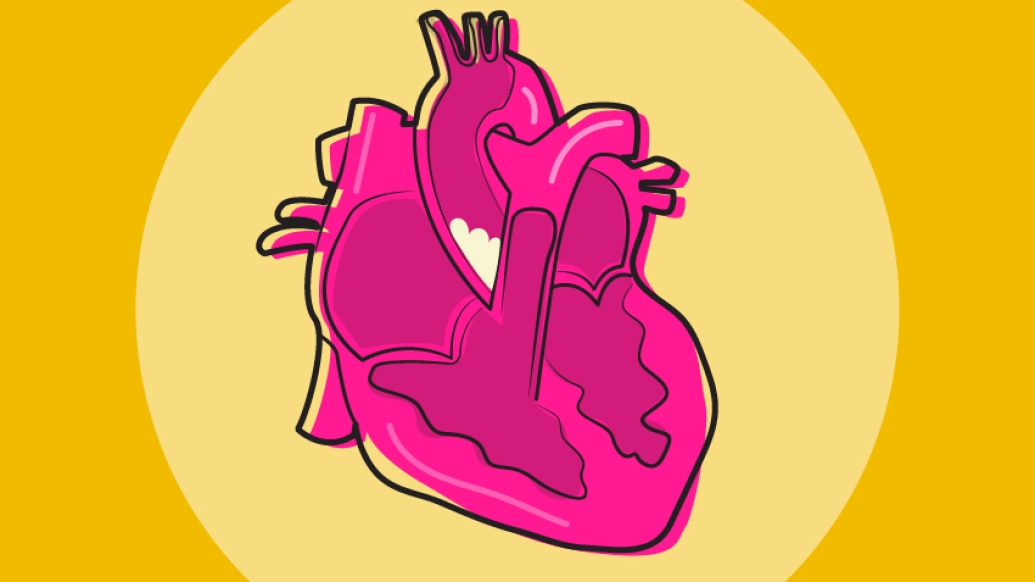For American Heart Month, a cardiologist explains different types of heart disease and how to improve heart health
2:05 PM
Authors |

Perhaps it’s a family member, a friend, a neighbor or colleague — chances are you know someone that’s been affected by heart disease.
A disease that went from uncommon to the most common cause of death in the span of 50 years.
While this rise in mortality was largely due to the increasing prevalence of coronary heart disease – linked to unhealthy habits such as smoking, drinking alcohol, inactivity and poor diet – there are many types of heart disease a person can have.
American Heart Month is intended to increase awareness of and educate the public on heart disease, empowering you to take action to protect yourself against it.
Here, Tanuka Piech, M.D., a cardiologist at the University of Michigan Health Frankel Cardiovascular Center, answers questions about heart disease, why we should care and what we can do to help prevent it.
What is heart disease?
Piech: As the heart is comprised of chambers, valves, arteries and vessels, heart disease can come in many forms. Here are some of them:
- Atherosclerotic disease (the buildup of fats, cholesterol and other substances in or on the artery walls): We are most accustomed to hearing about (and worrying about) coronary artery disease. This refers to plaque buildup in the coronary arteries, which supply blood to the heart muscle itself. In addition to atherosclerosis of the coronary arteries, you can also get plaque buildup in the aorta (the major blood vessel that connects the heart to the rest of the body) as well as the downstream vessels that supply blood to the brain and other organs.
- Electrical conduction system disease: Problems in electrical connections and communication between heart chambers is known as electrical conduction system disease. This can manifest as irregular heartbeats, or arrythmias, both abnormally fast (such as supraventricular tachycardia, atrial fibrillation or flutter) or abnormally slow (heart block, sick sinus syndrome) heart rhythms.
- Congenital heart disease: Heart conditions that you are born with, and can be genetic, are referred to as congenital. This can affect virtually any component of the heart including, but not limited to, abnormal heart chambers, connections, heart valve structures, heart muscle composition and coronary artery anatomy.
- Valvular heart disease: Valves are the structures that connect the four chambers of the heart to each other. This occurs when there is abnormal stiffening or leakiness of these valves.
- Cardiomyopathy: An abnormal heart muscle is known as a cardiomyopathy. This can come from:
- Decreased blood flow to heart muscle leading to weakness
- Untreated high blood pressure causing stiffness
- Abnormal deposits of components within heart muscle leading to thickness
- Certain forms of stress
- Pregnancy
- Infection with certain viruses
How common is heart disease?
Piech: According to the Centers for Disease Control and Prevention, heart disease is the leading cause of death for all genders in the United States. In fact, in 2021, one out of every five deaths were attributable to heart disease.
It is important to note that the risk of heart disease is often underestimated in women. Several factors are at play for this discrepancy, including less self-awareness, lower female representation in clinical trials, less aggressive risk factor identification and treatment strategies and differences in clinical presentation of chest pain.
What causes heart disease?
Piech: Regarding atherosclerotic heart disease, an inactive lifestyle, poor diet, tobacco use and premature, genetic coronary artery disease can all put you at risk. These risk factors increase the likelihood of developing comorbidities such as obesity, hypertension, diabetes, high cholesterol, kidney disease and obstructive sleep apnea. The more of these comorbidities you have, the higher the chances of accelerating the atherosclerotic plaque buildup in your arteries that lead to heart attacks and strokes.
When it comes to valvular heart disease and electrical conduction system disease, however, normal aging with “wear and tear” can sometimes cause valves to stiffen and electrical wiring to scar over time. While there is no way to prevent such stiffening or fibrosis, regular exercise and a heart healthy diet will keep your heart well-conditioned to adapt more readily to these changes and increase your options and chances for successful treatment.
What are symptoms of heart disease?
Piech: While symptoms can be broad, chest pain and/or shortness of breath that comes on with and is disproportional to your degree of activity is often more associated with atherosclerotic heart disease.
In addition, feelings of your heart racing (palpitations) can indicate an abnormal heart rhythm, while light headedness and fatigue can indicate abnormal, slow heart rhythms.
If heart muscle function is involved, swelling in both your legs and shortness of breath, particularly when you try to lay down, may manifest.
How is heart disease treated?
Piech: Heart disease treatment depends on what kind of disease you have. For example, when the heart muscle is weak from a cardiomyopathy, there are a number of standard “goal directed medications” that are initially prescribed to strengthen heart muscle.
Treatment options for atherosclerotic heart disease range from medications to non-surgical heart artery stenting and open-heart bypass surgery, depending on symptoms and severity of plaque buildup.
Electrical problems are often treated with medications, devices such as pacemakers and/or procedures such as cardioversions and ablations.
And of course, treating underlying risk factors is always key in preventing progression and reoccurrence of heart disease.
How can you improve heart health?
Piech: Maintaining an active lifestyle is key, but just getting those steps in every day is not enough. Overall, we recommend at least 150 minutes, split up however you choose, of cardiovascular exercise a week. Fast-paced walking, jogging, running, swimming, biking, etc., all qualify. Always remember, something is better than nothing.
Additionally, proper heart healthy nutrition is the foundation to your heart health. The Mediterranean Diet is one of the best diets out there to prevent and slow progression of atherosclerotic heart disease. If you have hypertension or diabetes, also keep in mind to maintain a low sodium, low sugar diet, respectively.
Avoiding harmful substances such as tobacco and limiting alcohol will also improve your heart health.
And last, but certainly not least, learning to cope with and minimizing the stress in our life is necessary. Meditation apps, calming music, yoga and good social support can help ensure we are both mentally and physically well.
Sign up for Health Lab newsletters today. Get medical tips from top experts and learn about new scientific discoveries every week by subscribing to Health Lab’s two newsletters, Health & Wellness and Research & Innovation.
Sign up for the Health Lab Podcast: Add us on Spotify, Apple Podcasts or wherever you get you listen to your favorite shows.

Explore a variety of healthcare news & stories by visiting the Health Lab home page for more articles.






